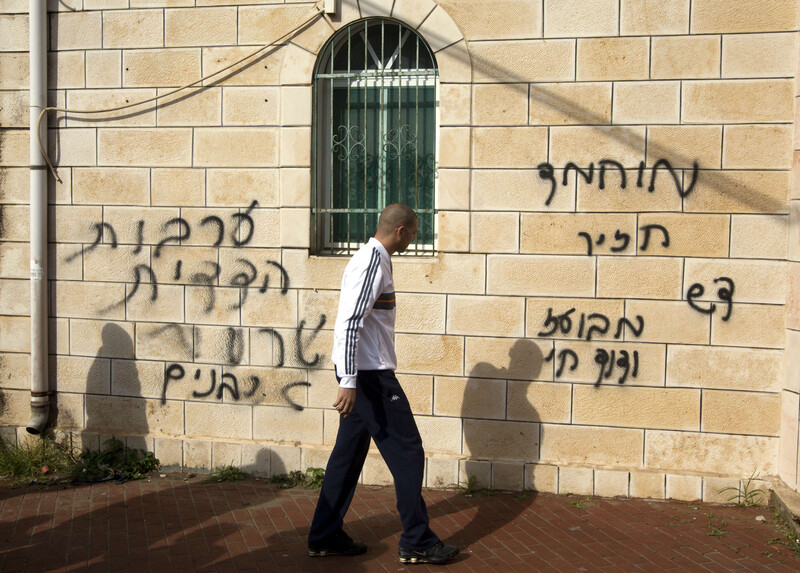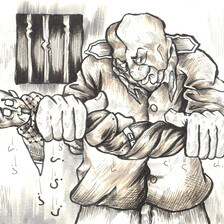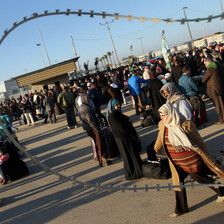The Electronic Intifada Baqa al-Gharbiyya 19 December 2013

Hebrew-language graffiti reading “Muhammad is a pig” and other threatening slogans were spray-painted on a Baqa al-Gharbiyya mosque.
AFP PhotoOn 8 December, right-wing Israeli extremists vandalized a mosque and several cars in Baqa al-Gharbiyya, a Palestinian town situated in the central district of present-day Israel.
“As we were on the way to the mosque for morning prayers, we noticed that there was writing on the wall,” Sheikh Khiri Eskandar told The Electronic Intifada. “When we read it, we saw that was written were things about our prophet that I cannot even say.”
The attackers left anti-Muslim graffiti spray-painted in Hebrew on the side of the mosque. They also smashed the windows out of four cars parked in the surrounding neighborhood. As well as an insult directed at the prophet Muhammad, the words “mutual responsibility” were spray-painted on the wall, suggesting that Israeli Jews have an obligation to carry out such attacks. “Terror stones” was another slogan found on the mosque, although its exact meaning was not clear.
The attacks were part of a broader campaign of vandalism against Palestinian property — often referred to as “price-tag” incidents — that occur on both sides of the so-called Green Line which separates present-day Israel and the occupied West Bank.
Such attacks are usually carried out by extreme right-wing settlers and often target Christian and Muslim holy sites in retribution for Palestinian resistance operations or Israeli governmental policies believed to be harmful for settlers.
“We are used to this kind of racism, but it is the first time it happened here in Baqa al-Gharbiyya,” added Eskandar, who is also the head of the town’s chapter of the Islamic Movement in Israel.
Eskandar said that although there are cameras monitoring the town’s mosques and the surrounding areas around the clock, Israeli police officers told him that they did not have a solid lead on who the attackers were. “But I’m certain that the license plates on their cars are visible in the security videos,” he added.
He said that although relations between the town and surrounding Jewish areas were amicable, Baqa al-Gharbiyya has suffered land loss to Israeli settlements, Israel’s wall in the West Bank and the expansion of Highway 6, which connects southern Israel to the Galilee region in the north.
Making our lives miserable
Eskander believes the same settlers known for committing similar attacks across occupied East Jerusalem and the broader West Bank are responsible for vandalizing the mosque. “This is all about taking more land and making our lives miserable so that we’ll leave,” he said.
Emran Abu Seny, whose car windows were smashed out during the same attack, told The Electronic Intifada that his car was parked in front of his home, approximately fifty meters from the mosque. He added that the windows of his father’s car were also busted.
“When I woke up in the morning, I was obviously shocked to find my car like this,” he said.
Because there was heavy rain that night, Abu Seny explained that no one in his home heard the cars being smashed. “It’s shocking,” he said. “You ask yourself who could do this and why.”
Abu Seny recalled that once he walked down the street and saw the graffiti on the mosque, he understood what had happened. In order to repair his car and his father’s, he paid 1,300 shekels for each (approximately $370).
“The police told me that they don’t know who did it,” he added. “Their military can target specific individuals in Gaza to shoot and kill with rockets as they drive in their cars, but they don’t know who broke my car even when they have security video footage.
“It’s racism against Arabs in general and Muslims in particular. If it happens in a Jewish area, they catch the suspect the same day and it’s considered terrorism. When violence happens to us, the police call it a criminal case and never seem to find out who the attackers are.”
Although the police have formally opened an investigation into the incident, Eskandar emphasized that he has no hope that the perpetrators will be brought to justice. The police “keep telling us that they want justice, but they are laughing at us. Even the prime minister [Benyamin Netanyahu] says that the state should treat Arab citizens differently. Of course, the police are not going to defend us on the ground.”
“Racist ideas”
Following the attacks, about 1,200 persons protested in the town’s main square that same day. “We respect all the prophets, those that are present in all the faiths,” Eskandar said, referring to figures present in Islamic, Christianian and Judaic traditions. “Naturally, we are going to be angry when this sort of thing happens.”
Eskandar explained that the “price-tag” attack in Baqa al-Gharbiyya comes from the same “racist ideas” promoted by Israel’s government and its policies. Rather than officially condemning the attacks, Israel and its police have tried to portray the attack as a criminal offense rather than a politically-motivated act.
On 10 December, two days after the attack in Baqa al-Gharbiyya, a similar attack was carried out in Akbara, a Palestinian village near the city of Safed in the Galilee region. The slogan “stop assimilation, Arabs get out,” was spray painted on a building, according to Ma’an News Agency (“Racist graffiti sprayed in Palestinian village in northern Israel,” 10 December 2013).
At least ten cars had their tires punctured as well.
A Muslim cemetery in the Mamila area of East Jerusalem was defaced in a similar attack in late November. “Death to Arabs” and “price-tag” were spray-painted on several of the tombstones (“Price-tag attack suspected at Muslim cemetery in Jerusalem,” The Jerusalem Post, 17 November 2013).
In June, during a committee meeting in Israel’s parliament, the Knesset, police disclosed that Israeli settlers carried out at least 165 price-tag attacks against Palestinian properties across Israel and the West Bank in a one-year period (“Vandals hit mixed suburb of Jerusalem,” The New York Times, 18 June 2013).
The organization Americans for Peace Now documents price-tag attacks. It has listed hundreds of incidents involving burning, smashing, spray-painting and deflating the tires of Palestinian cars, as well as similar acts of vandalism on churches, mosques, homes and businesses.
“They want to attack us like this because they think it will get to us,” Eskandar said. “But it won’t work because we know what [Israel] is trying to do — our resistance will only increase.”
Patrick O. Strickland is an independent journalist and frequent contributor at The Electronic Intifada. His writing can be found at www.patrickostrickland.com. Follow him on Twitter @P_Strickland_.





